반응형
Setting up Xen Dom0 kernel 2.6.31.13 on OpenSuse 11.2
* Installation methods are as follows
(1) Binary tarball from xensource.com(xen-3.x.x-install.tgz)
(2) RPM download and install
(3) Online Package installation by zypper or yast or yast2(software installation)
(4) From source
- Xen source(make dist-xen,...) / Kernel source+patch(Patch & make modules_install & modifying grub)
- Xen source / Custom kernel source(make ARCH=xen xconfig, ...)
* Must-have softwares
(1) bridge-utils(brctl,...)
(2) hotplug system(mostly in Linux udev)
(3) Build utils and related(gcc, binutils, GNU make, zlib, python)
1. Check virtualization env. if needed
# rpm -qa | egrep "(xen|virt)" | sort
2. Disable SElinux if installed
3. Install xen related packages and build tools
(Or install RPMs by yast, yast2 GUI interface...If U r lucky enough).
# zypper search xen*
# zypper install xen xen-devel xen-doc-html xen-doc-pdf xen-libs xen-tools xen_server
# zypper install make gcc gcc-c++
3-1. Or, install xen by building source like this...
# wget http://bits.xensource.com/oss-xen/release/3.4.2/xen-3.4.2.tar.gz
# tar -xvzf xen-3.4.2.tar.gz
# cd xen-3.4.2
# zypper install dev86 => essential to build !!
# make dist-xen dist-tools dist-stubdom
# make install-xen install-tools install-stubdom
3-2. Download Vanilla kernel source & xen patch
# cd /usr/src
# wget http://www.kernel.org/pub/linux/kernel/v2.6/linux-2.6.31.12.tar.bz2
# tar xvjf linux-2.6.31.12.tar.bz2
# mv linux-2.6.31.12 linux-2.6.31.12-xen-byMe
# wget http://gentoo-xen-kernel.googlecode.com/files/xen-patches-2.6.31-10.tar.bz2
# mkdir xen-patches-v10_2.6.31.12
# cd xen-patches-v10_2.6.31.12
# tar xvjf ../xen-patches-2.6.31-10.tar.bz2
# cd ../
# cd linux-2.6.31.12-xen-byMe
# for i in `ls ../xen-patches-v10_2.6.31.12/`; do patch -p1 < ../xen-patches-v10_2.6.31.12/"$i"; done
3-3. Copy original kernel config file for convenience
# cp /boot/config-2.6.31.xx-generic .config
* curses lib will be required...
# make menuconfig => Set each items exactly !
-----------------------------------------------
Processor type and features --->
[*] Enable Xen compatible kernel
Networking support --->
Networking options --->
<*> 802.1d Ethernet Bridging
Device Drivers --->
XEN --->
[*] Privileged Guest (domain 0)
<M> Backend driver support
<M> Block-device backend driver
<M> Block-device tap backend driver
<M> Block-device tap backend driver 2
<M> Network-device backend driver
<M> PCI-device backend driver
<M> SCSI backend driver
<M> USB backend driver
<*> Block-device frontend driver
<*> Network-device frontend driver
<M> SCSI frontend driver
<M> USB frontend driver
<*> Framebuffer-device frontend driver
<*> Keyboard-device frontend driver
[*] Disable serial port drivers
<*> Export Xen attributes in sysfs
Xen version compatibility (3.3.0 and later) --->
3.3.0 and later
-----------------------------------------------
3-4. Xenifying Kernel - Make & install
# export CONCURRENCY_LEVEL=5
# make => maybe some hours ... --;
# make modules
# make modules_install
# make install
* If using mkinitramfs,
# mkinitramfs -o /boot/initrd.img-2.6.31.12-xen-byMe 2.6.31.12-xen-byMe
* Or if mkinitrd,
# depmod -a 2.6.31.12-xen-byMe
# mkinitrd /boot/initrd-2.6.31.12-xen-byMe.img 2.6.31.12-xen-byMe
3-5. Now, edit Grub menu
# vi /boot/grub/menu.lst
Title Xen 3.4.2 - Kernel 2.6.31.12 on OpenSUSE 11.2
kernel /boot/xen.gz dom0_mem=512000
module /boot/vmlinuz-2.6.31.12-xen-ByMe ...
module /boot/initrd-2.6.31.12-xen-byMe.img <= Add this line
4. Reboot the system by Grub menu - Xen kernel
# chkconfig --add xend
# chkconfig xend on
# /etc/init.d/xend start
# chkconfig --add xendomains
# chkconfig xendomains on
# /etc/init.d/xendomains start
# chkconfig --add libvirtd
# chkconfig libvirt on
# /etc/init.d/libvirtd start
5. Check if Xen dom0 system is correctly set up
# ps aux | egrep "(xen|virt)" | sort
...xenwatch, xenbus, xend, HalDaemon.py, xenstored, xencolsoled, libvirtd, ...
All done, now test it by creating VMs.
반응형
'Technical > Cloud, Virtualization, Containers' 카테고리의 다른 글
| Fedora 14 Dom0 Kernel (Xen 4.0.1-6) 설치 - Virtual Machine 사용을 위한 준비 (2) | 2010.11.11 |
|---|---|
| OpenSUSE 11.3 kernel 2.6.34.7-0.5-xen, Xen 4.0.1에서 windows hvm quest 설치 (0) | 2010.11.06 |
| OpenSuse 11.2 dom0 - PV domU VM creation from CentOS5.4 DVD & http setup (0) | 2010.06.06 |
| 가상화의 물결 (0) | 2010.05.19 |
| OpenSuse 11.2, Xen Kernel(Dom-0) 상태에서 Nvidia 9800GT 잡기(kernel 2.6.31.12-0.2-xen) (0) | 2010.04.19 |
